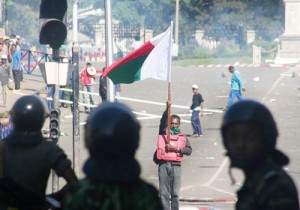After the power transfer that took place on March 17th in Madagascar, unrest is still growing strong in the island nation. 15,000 protested against the coup Saturday for the sixth consecutive day and have been tear-gassed by armed forces for three days straight. Sunday, On March 28th, civil protesters were shot at and wounded by police forces, resulting in 34 wounded and a few unaccounted for.
Stephen Ellis, co-author (with Solofo Randrianja) of Madagascar: A Short History, and professor at the Free Unversity of Amsterdam, explains the roots of the turmoil in Madagascar:
Madagascar's instability derives in large part from the combination of extreme poverty (the fate of some 70% of its people) and the fact that the island has one of the world's highest birthrates (the population has increased from less than 3 million around 1900 to 6 million in 1960, to 20 million today). The arrival of large numbers of young people every year looking to join the job market has created a volatile atmosphere in Antananarivo[..] Ravalomanana was elected to a second term in 2006. But even as president he continued to pursue his interests as one of the country's leading businessmen, and there is no doubt that this contributed greatly to his downfall [..] He also made a grave error in negotiating with a South Korean company that wanted to lease an enormous agro-business concession to grow food for export. This raised fears over land tenure in a country where people are intensely attached to their ancestral land
Ethan Zuckerman explains the relationship between the failed land deal with the South-Korean company Daewoo Logistics and the current unrest:
The Korean corporation recently signed an unprecedented agreement to lease 3.2 million acres of arable land from Madagascar at $12 an acre [..] Daewoo plans to put most of the land under corn for export to Korea and the remainder under oil palms, hoping to export the oil on the bio-fuels market. This is a very odd deal, given that Madagascar is a nation that faces food insecurity and has a population that, for the most part, is composed of subsistence farmers[..] Given the ecological sensitivity of the island, it seems like untouched land might be a resource the nation would want to conserve in the long term.
On March 17th, deposed president Marc Ravalomanana handed over power to a military committee so that a referendum on the state of the nation could be organized. The then-opposition rejected that arrangement and power was transferred to the opposition leader Rajoelina.
Citing this rapid transfer of power, the new government argues they did not stage a coup, an opinion the international community does not share. U.S. Ambassador Niels Marquardt declared to Midi Madagasikara newspaper that he witnessed first-hand the use of military force and threats during the takeover (fr):
J'ai pu voir de mes propres yeux jusqu'à quel point on a eu recours à la force dans ce coup d'Etat. Moi-même, j'ai été menacé verbalement et avec des fusils. Ce n'est pas normal que les militaires d'un gouvernement menacent les diplomates accrédités dans le pays.
Here is a video of the events narrated by the US Amabassador:
A few days later, several countries froze aid to Madagascar.
The pinch from this suspension of funds was felt almost immediately by many by entrepreneurs in Madagascar. Andriatefihasina Hary wrote on the Facebook bulletin board entitled:” What do you fear about the suspension of international aid? (fr):
A titre personnel, je trouve problématique la suspension des aides extérieures. A titre d'exemple, nous faisons un chantier financé par la banque mondiale. Si leur retrait se confirme, nous serons obligé de licencier tout le monde
Hary's example is only one of many. Eric Koller, head of Madagascar's hotel and restaurant federation explains to the BBC :
Eighty per cent of hotels are closing and the provinces have been especially hard hit. Most hotels have reduced staff by 50%, and some have laid off all staff without pay.
Even Madagascar's biodiversity is now facing urgent threats. Revkin on the New York Times Dot Earth blog explains that Marojejy National Park, famous for its endangered species, is now being invaded by loggers and its director threatened.
March 28th may turn out to be another turning point in the enduring crisis in Madagascar.
Videos taken during the demonstration against the coup show that police dispersed the crowd by firing on protestors and using tear gas (fr):
A protester named Razily carrying a Malagasy flag has struck the imagination of the Malagasy blogosphere. He was filmed marching towards the armed forces alone, while bullets hit the ground around him until he was eventually pushed into a van by the police. A video of Razily was also posted on the New York Post:

Razily facing police March 28th (via topmada.com)
Many twitterers reacted to Razily's act of bravery.
Hery notes (fr):
Un manifestant courageux arreté par les militaires à #madagascar
TJ writes that the video has a familiar feel to it:
video from #madagascar : man (alone) w/ a malagasy flag arrested by military force, scene reminiscent of tiananmen square.
Aliostsy adds:
This “Tiananmen” moment in #Madagascar could rally opposition to the new TGV regime. “
Given the events of the past couple of days, it seems that tension has yet to ease in Madagascar. The Economist suggests that the new government is still on rather fragile ground.
Finally, as we look back at the cause of this crisis, Alex Evans blogs at the Global Dashboard that South Korea still does not seem to understand what the fuss is all about: one of the largest national newspapers, Chosun Ilbo, publishes a rather controversial cartoon depicting a black-faced mob with sticks going after a Korean worker seeding the land.







8 comments
Just a slight correction. There were 34 injured during Saturday’s protest, it was not on Sunday :)
Absolutely, thanks Tahina for spotting the mistake. I amended the post with the precise date for more clarity.
thanks Lova! Great post.